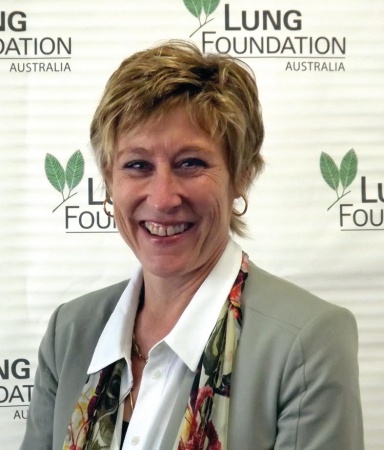Lung Foundation Australia’s recent Federal Budget submission urges the government to ensure lung disease receives the funding and support needed to reduce its impact as the nation’s second leading cause of death.
CEO of Lung Foundation Australia, Heather Allan, said the submission outlines six high priority and cost-effective actions that will transform the lives of those affected by lung disease, including Chronic Obstructive Pulmonary Disease (COPD), lung cancer and Idiopathic Pulmonary Fibrosis (IPF).

“Lung Foundation Australia has put forward six evidence-based priorities that have proven effectiveness and can be implemented nationally,” Mrs Allan said.
“The majority of these priorities (not including Medicare Benefit Scheme listings) can be delivered for approximately $27.5 million over three years and they will help to significantly reduce hospitalisations and deaths related to lung disease. This is a small ask when you look at the number of men and women – young and old – who are losing their lives or their quality of life to lung disease,” she said.
Mrs Allan said that despite positive developments in tobacco control and recent access to life changing medications for those with IPF and lung cancer, lung disease currently does not receive the funding and support warranted by its impact and relative to its burden.
“Lung disease contributes more than 10% to the overall health burden in Australia[i] and has a major impact both in terms of healthcare utilisation and lost quality of life for patients and carers,” she said.
“Over the past 15 years, the Commonwealth Government’s investment in research, education and support to improve the outcomes in one lung disease – asthma – has seen a dramatic reduction in hospitalisations and asthma deaths in Australia.
“A similar investment in high impact lung diseases like lung cancer, COPD and IPF is desperately needed and would see equally beneficial outcomes,” she said.
An overview of Lung Foundation Australia’s Budget Submission six priorities:
| Priorities | Cost |
| Widen access to pulmonary rehabilitation, a comprehensive 6-8 week exercise and education program provided by specially trained health professionals to improve quality of life and reduces symptoms, mortality, hospitalisations/readmissions and in-patient bed days[ii]. | Overall savings to the sector through prevented hospitalisations and reduced length of stay. |
| Facilitate earlier detection and diagnosis of lung disease through awareness, primary care education and appropriate reimbursement for spirometry testing at primary care. | Awareness: $5M over 3 years
GP education: $200,000 one off development costs Spirometry reimbursement: MBS fee |
| Increase capacity of primary care sector to manage chronic lung disease by scaling up existing national training initiatives. | $5M over 3 years |
| Provide funding for specialist lung cancer nurses.
Evidence suggests that Specialised Lung Cancer Nurses (SLCNs) are well placed to address the gaps and barriers and challenges faced by people at all stages in the lung cancer trajectory. SLCNs ensure patients’ needs and preferences are addressed from pre-diagnosis through to end of life and is critical to coordinate and optimise care for patients, as well as to provide them with clinical, social and emotional support[iii]. |
$8 M to implement a two year pilot program and evaluation |
| Support chronic lung disease patient and their carers.
A national program designed to systematically refer to and provide coaching support will support patients to take more control of their disease and manage their symptoms, thus keeping them well, enhancing quality of life, and staying out of hospital. |
$1.2M over 3 years |
| Redress research funding gap for lung disease to reflect the burden of disease.
Despite the significant burden of lung disease in Australia, research in lung disease is significantly underfunded. Investment in lung disease research undoubtedly drives improvement in quality experiences and outcomes for patients and which, in turn, contributes enormous social and economic benefits. |
$8.1M over 3 years |


